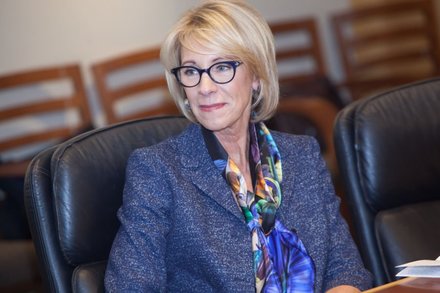Subscriber Benefit
As a subscriber you can listen to articles at work, in the car, or while you work out. Subscribe NowIn a speech in Indianapolis to the advocacy group she previously led, Betsy DeVos hinted that an aggressive plan to expand public funding of private schools through the federal government is on the way.
The U.S. education secretary offered few details about the plan, which she said would be voluntary for states. And with an administration besieged by controversy, a skeptical Congress, and disagreement among even school choice supporters, it faces an uphill battle.
That did not deter DeVos in her speech at the annual American Federation for Children conference downtown.
“The president is proposing the most ambitious expansion of school choice in our nation’s history,” she said, soon after being greeted by a standing ovation from school choice supporters. “If a state doesn’t want to participate, that would be a terrible mistake on their part. They will be hurting the children and families who can least afford it.”
School choice comes in many forms, but DeVos and the American Federation for Children have long advocated for vouchers and tax credit programs that provide public money to families in order to pay private school tuition. While proponents argue these initiatives provide a lifeline to low-income students, critics say they drain resources from public schools and are ineffective at improving student achievement.
Indeed, DeVos was met with protests from several dozen teachers and public education advocates who criticized her plan before it had even been released. Voucher programs “rob a majority of the students—we’ve got more than 90 percent of the kids in this country sitting in public schools,” Indiana State Teachers Association President Teresa Meredith told Chalkbeat after a rally held before DeVos’s speech.
Even certain school choice supporters are critical of a federal proposal.
“School choice would not only risk being branded as TrumpChoice, but it would be fronted by an unpopular and divisive president,” wrote Rick Hess of the conservative American Enterprise Institute. “Democrats who are open to school choice but who despise Trump might wonder if they’re missing something when it comes to school choice.”
One prominent school choice supporter, U.S. Rep. Todd Rokita of Indiana, has already backed the proposal. Still, few seem to expect it to become law. In 2015, a bid to give states the option to use federal money to fund private school tuition was easily voted down in the Senate.
In her speech, DeVos emphasized that the administration’s proposal would devolve power to the states, thought it’s unclear how she would accomplish this seemingly paradoxical goal through a federal program.
“We shouldn’t view this as a chance to mandate a one-size-fits all school choice proposal,” she said. “We won’t accomplish our goals by creating a new federal bureaucracy or by bribing states with their own taxpayers’ money.”
The last line was perhaps an allusion to the Obama administration’s Race to the Top program, though she didn’t specify how the Trump administration’s plan would work differently.
Insofar as states will have a choice about school choice, DeVos is clear which direction she thinks they should go.
“Let me be very clear, I firmly believe every state should provide choices and embrace equal opportunity in education,” DeVos said. “But those are decisions states must make—no two states are the same and no two states’ approaches will be the same, and that’s a good thing.”
The secretary offered a bevy of options that epitomize the “open system” of choices that families should have access to: “It shouldn’t matter if learning takes place in a traditional public school, a Catholic school, a charter school, a non-sectarian private school, a Jewish school, a home school, a magnet school, an online school, any customized combination of those schools—or in an educational setting yet to be developed.”
Earlier in the evening, Indiana’s Republican governor, Eric Holcomb, appeared, and former Florida Republican Gov. Jeb Bush is scheduled to speak at the conference on Tuesday. Although New Jersey Sen. Cory Booker spoke to the group in previous years, no current elected Democrat appears on this year’s agenda.
DeVos seemed keenly aware of the increasingly partisan breakdown on school choice issues, particularly on school vouchers.
“The oldest school choice program in the country was started by the Democrat,” she said, referring to Milwaukee’s long-running school voucher system. “If you hear nothing else I say tonight, please hear this: Education should not be a partisan issue.”
Currently, about 450,000 students use a voucher or tax-credit funded scholarship to attend a private school.
Recent research in Indianapolis, Louisiana, Ohio, and Washington, D.C., has shown students receiving a voucher saw their test scores drop. There is little research on tax credit programs, partially because many don’t require participating students to take their state test or any test at all.
Private school choice programs have also come under criticism for requiring students with disabilities to waive their rights under the Individuals with Disabilities Education Act and under-serving those students. Existing voucher programs also allow private schools discriminate against LGBT students.
Proponents point to evidence that public schools improve in response to competition from vouchers, as well as older studies showing that some students attending a private school are more likely to graduate from high school and attend college.
When Chalkbeat asked Secretary DeVos, as she was leaving through a side entrance, what she thought of recent research on school choice, she responded only, “We’re not taking questions.”
Chalkbeat is a not-for-profit news site covering educational change in public schools.
Please enable JavaScript to view this content.

